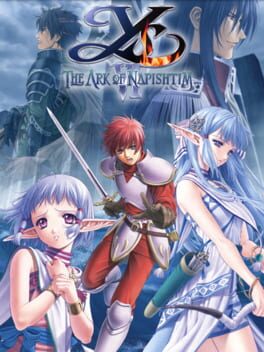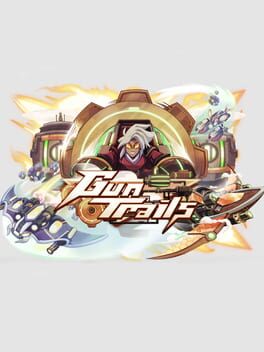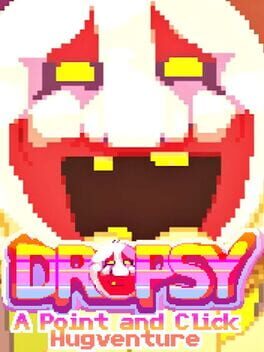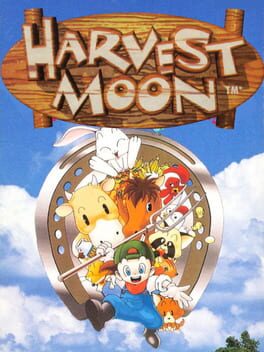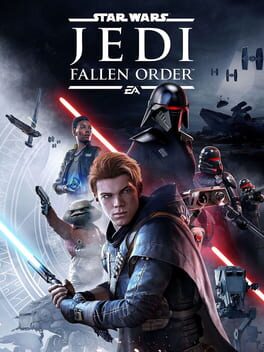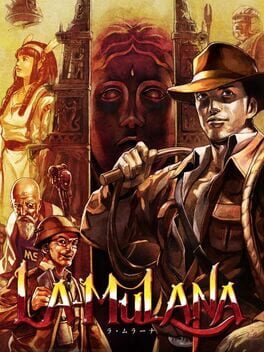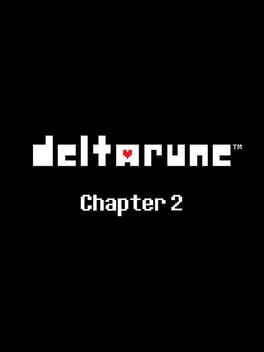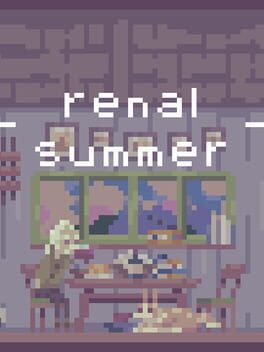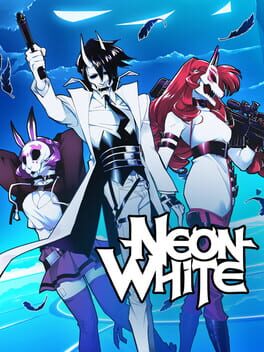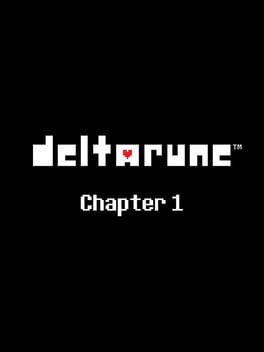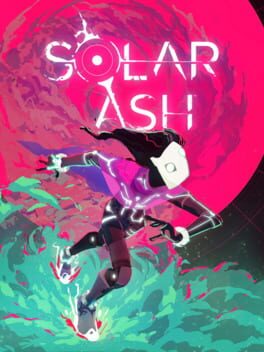nex3
BACKER
51 Reviews liked by nex3
Who's Lila?
2022
This review contains spoilers
RPGS RULE FOREVER
Man what a great game. Combat is so satisfying, and the level curve is incredibly fun. I'm not used to a game making single level gains this dramatic relative to a specific area's enemies; it sells the power fantasy of growing strong, and makes the frustration of dealing with enemies just a little too strong for you that much more manageable.
Man what a great game. Combat is so satisfying, and the level curve is incredibly fun. I'm not used to a game making single level gains this dramatic relative to a specific area's enemies; it sells the power fantasy of growing strong, and makes the frustration of dealing with enemies just a little too strong for you that much more manageable.
Gun Trails
2023
I really wanted to like this, but it ended up being a pretty big disappointment.
The art and music are great - it feels like aesthetics were their major focus. Playability suffers a lot though. The focus on detailed sprites means your ship and enemies are enormous despite the small screen, which gives you very little space to maneuver. It's even worse because your ship's speed is so fast; you want the ability to move slowly to dodge large waves of bullets, but you don't get that here. Since the screen is so crowded with large sprites enemies have a tendency to spawn out of nowhere, which makes it even more dangerous to move. It seems to be influenced by Cave games but doesn't really take into account that they make ship positioning a big part of gameplay - Gun Trails actively discourages you from moving around the screen or trying to stake out a position.
The super weapon feels like an attempt to do a take on Dodonpachi's hyper - a strong laser that does high damage, and that charges up as you maintain enemy combos. Unfortunately, the game intentionally takes away any stored charge when you encounter minibosses, which denies you the ability to use a stored up super weapon in exactly the time you'd want to use it. It's also the only way to slow down your ship's movement, which feels awkward and limited.
After playing I booted up GG Aleste again and it reminded me how other portable shmups on small screens have intentionally gone for smaller sprites to maintain maneuverability and the sense of a larger playfield. I found myself wishing Gun Trails had made the same choice.
The art and music are great - it feels like aesthetics were their major focus. Playability suffers a lot though. The focus on detailed sprites means your ship and enemies are enormous despite the small screen, which gives you very little space to maneuver. It's even worse because your ship's speed is so fast; you want the ability to move slowly to dodge large waves of bullets, but you don't get that here. Since the screen is so crowded with large sprites enemies have a tendency to spawn out of nowhere, which makes it even more dangerous to move. It seems to be influenced by Cave games but doesn't really take into account that they make ship positioning a big part of gameplay - Gun Trails actively discourages you from moving around the screen or trying to stake out a position.
The super weapon feels like an attempt to do a take on Dodonpachi's hyper - a strong laser that does high damage, and that charges up as you maintain enemy combos. Unfortunately, the game intentionally takes away any stored charge when you encounter minibosses, which denies you the ability to use a stored up super weapon in exactly the time you'd want to use it. It's also the only way to slow down your ship's movement, which feels awkward and limited.
After playing I booted up GG Aleste again and it reminded me how other portable shmups on small screens have intentionally gone for smaller sprites to maintain maneuverability and the sense of a larger playfield. I found myself wishing Gun Trails had made the same choice.
Dropsy
2015
What a lovely little game. Orienting pretty much every puzzle around "how do I hug this person" is such an inspired choice, really gets you into Dropsy's mindset. Having the community slowly get nicer and happier around you feels great as the story goes on, and making the whole thing a mid-sized nonlinear open world really let me develop an intimate sense of the space it takes place in.
Harvest Moon
1996
something about playing this game on virtual console non-stop for 24 hours straight during the summer of 2009 as a sixteen year-old taught me a valuable life lesson.
i learned how to scam the exhaustion system in the game. if you work late enough in the day, time will eventually stop in the early morning (i believe 5am to be exact).
once you reach this point, the only limiting factor you have is your stamina, which can be continually increased by visiting the hot springs in the mountains outside your farm or eating specific foods. by doing this repeatedly, you can lock into this cycle: tend to your farm until your virtual self collapses, go to the hot springs and wade around for a few seconds, and then repeat this cycle until you complete everything you need to.
i did this for two in-game years, until i had what i considered to be the ultimate farm. however, my farm required too much upkeep every day to keep everything happy. i had so much money that it became meaningless. i had spent so much time each day farming that i had NEVER ONCE EVEN TALKED TO ONE OF THE BACHELORETTES.
i couldn't garner the affection of one of the girls in a measly six months. it had to be earned over time. i would be alone in a decaying farm when my father showed up to evaluate me six in-game months later. i supposedly had everything that i thought i had wanted, only to see it crumble before me. i cried and turned off the console. in this moment i realized that capitalism makes fools of us all.
five stars.
i learned how to scam the exhaustion system in the game. if you work late enough in the day, time will eventually stop in the early morning (i believe 5am to be exact).
once you reach this point, the only limiting factor you have is your stamina, which can be continually increased by visiting the hot springs in the mountains outside your farm or eating specific foods. by doing this repeatedly, you can lock into this cycle: tend to your farm until your virtual self collapses, go to the hot springs and wade around for a few seconds, and then repeat this cycle until you complete everything you need to.
i did this for two in-game years, until i had what i considered to be the ultimate farm. however, my farm required too much upkeep every day to keep everything happy. i had so much money that it became meaningless. i had spent so much time each day farming that i had NEVER ONCE EVEN TALKED TO ONE OF THE BACHELORETTES.
i couldn't garner the affection of one of the girls in a measly six months. it had to be earned over time. i would be alone in a decaying farm when my father showed up to evaluate me six in-game months later. i supposedly had everything that i thought i had wanted, only to see it crumble before me. i cried and turned off the console. in this moment i realized that capitalism makes fools of us all.
five stars.
My issues with this game are as follows: the jump-platforming feels horrible. The maps are obnoxious to traverse and have horrible enemy placement to the point where about halfway through the game I just started running past 99% of enemies. Combat simply doesn't feel good. Nobody reacts to getting hit by a lightsaber at all, and having to parry large groups of enemies so you can break their poise so you can do a cutscene attack that gets interrupted by one of the other 9 enemies attacking you was more than frustrating. The wildlife was cool, but were far and away the most annoying enemies to fight (fuck the goats in particular). Parrying humanoid enemies or attacking during their endlag felt like nothing. People are swinging their weapons so wildly that it was difficult to ascertain when they're attacking or when they're in an animation that doesn't actually do any damage. The player hardly does any damage even after upgrading lightsaber strength, leading to some of the late-game bosses being a game of Simon Says where you just have to wait for one of the three safe openings so you can do .02% of their health bar. Dathomir is one of the most annoying areas I've seen in a Souls-like, which is a shame because the Nightsisters and brothers are cool as hell. Also for some reason the audio started lagging in every cutscene about halfway through the game, so characters would "say" something and then like 5 seconds later the audio of them saying it would come through. The story itself feels like they cut some stuff. Like when Greez comes to have a heart-to-heart with Cal, I was only thinking about how effective of a scene this would be if they put this in the game just a smidge later so I felt more attached to the relationship between the characters.
What I liked: mmm yummy star wars inject it into my veins. also the uncharted/assassin's creed platforming stuff worked pretty well. Customizing the lightsaber was pretty neat, and BD-1 is the best droid design I've ever seen. I want one. The coliseum area was really fun, although it was an extremely weird point to have it in the story and I'm still not totally sure what that was all about.
Overall, lots of actual gameplay stuff that made me want to drive my head through a wall, but the set dressing was great. Excited to play the sequel when that drops and feel Exactly The Same Way.
What I liked: mmm yummy star wars inject it into my veins. also the uncharted/assassin's creed platforming stuff worked pretty well. Customizing the lightsaber was pretty neat, and BD-1 is the best droid design I've ever seen. I want one. The coliseum area was really fun, although it was an extremely weird point to have it in the story and I'm still not totally sure what that was all about.
Overall, lots of actual gameplay stuff that made me want to drive my head through a wall, but the set dressing was great. Excited to play the sequel when that drops and feel Exactly The Same Way.
Vampire Survivors
2021
Despite its title this can't help be feel like as much a sequel to Demon's Souls. Partly this is down to the structure of the game, a central hub area branching off into a few different independent linear routes that you can tackle in any order you want before the game ultimately culminates in you finding and killing the monarchy of this land.
Partly this is down to the almost reckless creativity on display. If Dark Souls took the things from Demon's Souls that really worked and cut away the bits that arguably didn't, Dark Souls 2 has not a care in the world instead saying lets fuck around and find out. This was very much to my frustration in my first playthrough, but returning to this game a year later a lot of the things that previously frustrated me are honestly just endearing. As rough edges go, I think there's a lot of charm and personality to these ones.
Returning to this game in a post-Elden Ring world was also a lot of fun to me. People disparagingly compare that game to Dark Souls 2 occasionally, but I feel like playing Elden Ring taught me a lot about how to enjoy playing Dark Souls 2. It turns out a lot of the parts of Dark Souls 2 that are decried as being unfair are actually much more reasonable when you take advantage of all the tools the game gives you. This playthrough I abandoned my usual approach of just two-handing the chonkiest sword I could find all by my lonesome to instead play an extremely-multiclass build (turns out the excessive number of levels DS2 hands you are perfect for enabling you to dabble in everything) with summons alongside me and I actually had just a great time.
That's not to say there aren't some problems with the game even outside of the notorious Dark Souls 2 weirdness, and the last portion of my run was honestly a bit exhausting; I think the pile of dlc the game has is both very overhyped, and kind of excessive considering how gargantuan the base game already is. That said, somehow, I sit here a convert. Despite all its problems Dark Souls 2 is actually a rather delightful oddity.
Partly this is down to the almost reckless creativity on display. If Dark Souls took the things from Demon's Souls that really worked and cut away the bits that arguably didn't, Dark Souls 2 has not a care in the world instead saying lets fuck around and find out. This was very much to my frustration in my first playthrough, but returning to this game a year later a lot of the things that previously frustrated me are honestly just endearing. As rough edges go, I think there's a lot of charm and personality to these ones.
Returning to this game in a post-Elden Ring world was also a lot of fun to me. People disparagingly compare that game to Dark Souls 2 occasionally, but I feel like playing Elden Ring taught me a lot about how to enjoy playing Dark Souls 2. It turns out a lot of the parts of Dark Souls 2 that are decried as being unfair are actually much more reasonable when you take advantage of all the tools the game gives you. This playthrough I abandoned my usual approach of just two-handing the chonkiest sword I could find all by my lonesome to instead play an extremely-multiclass build (turns out the excessive number of levels DS2 hands you are perfect for enabling you to dabble in everything) with summons alongside me and I actually had just a great time.
That's not to say there aren't some problems with the game even outside of the notorious Dark Souls 2 weirdness, and the last portion of my run was honestly a bit exhausting; I think the pile of dlc the game has is both very overhyped, and kind of excessive considering how gargantuan the base game already is. That said, somehow, I sit here a convert. Despite all its problems Dark Souls 2 is actually a rather delightful oddity.
La-Mulana
2012
38 pages. That's how long our Google Doc was for this game, myself controlling the leading archaeologist Lemeza whilst my girlfriend assembled this fastidious record of game text (some parts given to us, others hand-translated), environmental clues and ancient drawings; seeing this document come together is like living inside that Pepe Silvia meme, bizarre connections constantly being drawn between disparate hints scattered several zones apart, a riddle from the second area of the game still highlighted halfway through the game because we somehow haven't found a use for it yet, a note saying to return to that statue for the twelfth time at some point because goddamn did it ever look at us funny. The thing is though that in La-Mulana all those moments that make you feel like you're going crazy are just true; hints or strange inklings that have bugged you forever will turn out to be helpful 30 hours later halfway across the map, no flavour text or background detail is safe from turning into critical information, and against impossible odds seemingly everything is interwoven into such a beautiful, fascinating, maddening tapestry in ways that were at times genuinely mind-blowing.
La-Mulana is a hard game to recommend. I think its reputation in regards to mechanical difficulty and unfairness is overstated, and the game has such a brilliant sense of humour that even its meaner traps tended to elicit smiles and laughter more than anything else, but it does ask a lot of the player in regards to patience, perseverance and thoughtfulness. Its reputation in regards to the difficulty of its puzzle-solving, however, is well-earnt; we did manage to complete the game largely without looking at hints or a guide (with the exception of checking what the various computer programs actually do about two-thirds of the way into our playthrough) so it is certainly very possible, but the game asks for a level of perceptiveness, deeply outside-the-box thinking and even just logical leaps of faith that you'll often feel like it is breaking you.
It's such a gorgeously crafted game though, one where you can feel the passion and love that went into it, with a killer soundtrack, one of the most deeply and rewardingly interlinked maps in all of gaming history, and a sense of imagination so vivid that it never ceases to surprise and inspire. La-Mulana is something special.
La-Mulana is a hard game to recommend. I think its reputation in regards to mechanical difficulty and unfairness is overstated, and the game has such a brilliant sense of humour that even its meaner traps tended to elicit smiles and laughter more than anything else, but it does ask a lot of the player in regards to patience, perseverance and thoughtfulness. Its reputation in regards to the difficulty of its puzzle-solving, however, is well-earnt; we did manage to complete the game largely without looking at hints or a guide (with the exception of checking what the various computer programs actually do about two-thirds of the way into our playthrough) so it is certainly very possible, but the game asks for a level of perceptiveness, deeply outside-the-box thinking and even just logical leaps of faith that you'll often feel like it is breaking you.
It's such a gorgeously crafted game though, one where you can feel the passion and love that went into it, with a killer soundtrack, one of the most deeply and rewardingly interlinked maps in all of gaming history, and a sense of imagination so vivid that it never ceases to surprise and inspire. La-Mulana is something special.
Deltarune: Chapter 2
2021
Renal Summer
2020
This game is fascinating.
The adoption of mobile game mechanics is really smart. In many games, details such as the time nudges, the requirement to log in regularly multiple times a day, and so on are designed to extract more money from the player. Renal Summer doesn't have microtransactions beyond a single "remove ads" payments, so it's able to use those same mechanics in very different ways. Over the seven days of the story, I felt compelled to check in on the dog to help them as much as I could. As soon as I realized their strength was fading, and I'd have to help more often to keep them able to live their normal life, it felt important for me to check in regularly even before the regular notification nags.
In general, the sad theme comes across as convincingly non-manipulative. It's very, very easy for a game about death to come across as either cloying or emotionally manipulative, but Renal Summer manages to be moving without being mawkish.
The retro aesthetic is a smart choice since it makes you expect something much more "gamey" than it actually is. There's a fascinating contrast between the game field, the very gamey playfield the player can actually interact with, and the naturalistic movements in the world outside which the player can only watch. The lifelike, smooth movement of the animation reminds me a lot of Ghost Trick; adopting the aesthetics of pixel art, but moving in a natural-feeling way that's only possible if the player isn't directly controlling any of the living characters.
The real-time nature of the storytelling is incredibly well-produced. Every little scene you witness feels realistic and honest, and the full 24-hour daily schedule the dog and the old man go through is incredibly detailed.
The adoption of mobile game mechanics is really smart. In many games, details such as the time nudges, the requirement to log in regularly multiple times a day, and so on are designed to extract more money from the player. Renal Summer doesn't have microtransactions beyond a single "remove ads" payments, so it's able to use those same mechanics in very different ways. Over the seven days of the story, I felt compelled to check in on the dog to help them as much as I could. As soon as I realized their strength was fading, and I'd have to help more often to keep them able to live their normal life, it felt important for me to check in regularly even before the regular notification nags.
In general, the sad theme comes across as convincingly non-manipulative. It's very, very easy for a game about death to come across as either cloying or emotionally manipulative, but Renal Summer manages to be moving without being mawkish.
The retro aesthetic is a smart choice since it makes you expect something much more "gamey" than it actually is. There's a fascinating contrast between the game field, the very gamey playfield the player can actually interact with, and the naturalistic movements in the world outside which the player can only watch. The lifelike, smooth movement of the animation reminds me a lot of Ghost Trick; adopting the aesthetics of pixel art, but moving in a natural-feeling way that's only possible if the player isn't directly controlling any of the living characters.
The real-time nature of the storytelling is incredibly well-produced. Every little scene you witness feels realistic and honest, and the full 24-hour daily schedule the dog and the old man go through is incredibly detailed.
Neon White
2022
it's hard for me to write a review about this game. i feel like it was designed in a lab to be optimally enjoyable for exactly me, much like how McDonald's french fries are chemically engineered to be Mathematically and Provably Delicious for the general American public.
i can't talk about Neon White without talking about Arcane Kids. in the mid-10s, being someone who staked a lot of identity into playing games was profoundly embarassing. ignoring the truly heinous shit that goes without saying, year after year, AAA studios continued to pump out "mids at best." on the other side of things, "indie" games were no longer new and were in something of an awkward puberty. i can't tell you how many "physics-based puzzle platformers with a gimmick" i had pitched to me that promised to be Actually Good. they weren't. however, during this time, the Unity weirdos were churning away in their art scenes around the globe. the new derisive joke became "make a game in unity, make a million dollars." of course, the people making these jokes didn't know what they were talking about, but i guess none of us really did back then.
---
Arcane Kids existed as something of an antithesis to the games of the time. when we had more than enough pixel-art RPGs, they gave us ZINETH. when we got innundated with walking simulators, they gave us Bubsy 3D: Bubsy Visits the James Turrell Retrospective. when indies decided to try and be funny with things like Goat Simulator, we got Sonic Dreams Collection, CRAP! No One Loves Me, and this (https://www.youtube.com/watch?v=-RNCyc3hzAw). while a lot of these games were "funny" or "jokes," they always had deeper ideas to them beneath the surface around player agency, the joy of moving your avatar, the love of Videogames As Videogames.
i cannot possibly explain how strange it felt to turn on the game and have the title screen after the intro cutscene splash in with a voice echoing "NEON WHITE" as the moodiest witch house track creeps in through your headphones. the fake scanlines, the neon glow on the characters, the tone, the vibes. i thought to myself, "they finally did it." as i played more, i confirmed my suspicions.
Arcane Kids finally made the game it feels like they had been working toward all these years. blazing fast, huge jumps, easy-to-learn-but-hard-to-master, tight, violent, horny, loud, freaky, all at once. in Mission 11, as breakneck-paced breakcore blasted out of my screen, i screamed aloud in my room to my partner who was watching me play "I. FUCKING. LOVE. THIS. GAME." in time with each click of the RMB that shot me across the map at incredible speeds. in moments like this, you know for a fact that moments like Bubsy pulling out an uzi and a katana at the end of Bubsy 3D or them subjecting a crowd of people at a game conference to vape trick videos that inspired their previous game (https://youtu.be/2pO23GTaBtk?si=ldB9w6CU2UC3TkHI&t=1791) was not just them contributing to the general irony-poisoned sense of humor of the time; they legitimately thought that it was tight as fuck.
-----
one line from the infamous Arcane Kids Manifesto (https://arcanekids.com/manifesto) that i always think about is "the purpose of gameplay is to hide secrets."
at a time when even FromSoft has started to move away from their smaller, more-focused world design in favor of chasing the lucrative open-world design potential in Elden Ring, it feels amazing that we have a game like Neon White that is about intricately crafted and infinitely replayable level design. after years of waiting, we finally have the one true Indie Puzzle Platformer, but this time it has guns.
the gameplay (for me, usually) fell into a flowchart like this:
-beat a level once and get whatever medal you get
-go back to find the secret gift
-during this second trip, notice which parts of the levels you can skip or save time on that were hidden to you before
-play the level a 3rd time to get a gold medal
-use the hint from the Gold medal to get an Ace medal on your 4th time
-over time, you begin to amass a collection of "hey, did you know this quirk" movement secrets like shooting bullets, bunny hopping after a dash, or sliding with the shotgun's discard
game design that calls attention to itself like this is beautiful. level designers are artists. we've known this since Doom WADs. however, in the time since Doom we've had several games like Gears of War, Halo, and their ilk that said "wasn't the sickest part about Doom being a huge buff guy with loud guns just blasting disgusting freaks and seeing them explode???" while that does indeed whip, Neon White is on the other side of the coin saying "wasn't the best part about Doom the level design and the joy of figuring out how to move as fast as you can through a level???"
after 11 years of watching speedrunning streams nearly every day, Neon White finally made me feel like maybe i could do it too. first you pit yourself against the Ace medal time, then your friends, then the Dev Times, then your own ghost, and then the world. to this day, i have yet to have a global #1, but i've had a #2 and two #3s. i'll keep going though.
[EDIT 7/17/23: i did it :) https://www.youtube.com/watch?v=PWT2b9pwRMI]
---
Neon White is a love letter in videogame form
i can't talk about Neon White without talking about Arcane Kids. in the mid-10s, being someone who staked a lot of identity into playing games was profoundly embarassing. ignoring the truly heinous shit that goes without saying, year after year, AAA studios continued to pump out "mids at best." on the other side of things, "indie" games were no longer new and were in something of an awkward puberty. i can't tell you how many "physics-based puzzle platformers with a gimmick" i had pitched to me that promised to be Actually Good. they weren't. however, during this time, the Unity weirdos were churning away in their art scenes around the globe. the new derisive joke became "make a game in unity, make a million dollars." of course, the people making these jokes didn't know what they were talking about, but i guess none of us really did back then.
---
Arcane Kids existed as something of an antithesis to the games of the time. when we had more than enough pixel-art RPGs, they gave us ZINETH. when we got innundated with walking simulators, they gave us Bubsy 3D: Bubsy Visits the James Turrell Retrospective. when indies decided to try and be funny with things like Goat Simulator, we got Sonic Dreams Collection, CRAP! No One Loves Me, and this (https://www.youtube.com/watch?v=-RNCyc3hzAw). while a lot of these games were "funny" or "jokes," they always had deeper ideas to them beneath the surface around player agency, the joy of moving your avatar, the love of Videogames As Videogames.
i cannot possibly explain how strange it felt to turn on the game and have the title screen after the intro cutscene splash in with a voice echoing "NEON WHITE" as the moodiest witch house track creeps in through your headphones. the fake scanlines, the neon glow on the characters, the tone, the vibes. i thought to myself, "they finally did it." as i played more, i confirmed my suspicions.
Arcane Kids finally made the game it feels like they had been working toward all these years. blazing fast, huge jumps, easy-to-learn-but-hard-to-master, tight, violent, horny, loud, freaky, all at once. in Mission 11, as breakneck-paced breakcore blasted out of my screen, i screamed aloud in my room to my partner who was watching me play "I. FUCKING. LOVE. THIS. GAME." in time with each click of the RMB that shot me across the map at incredible speeds. in moments like this, you know for a fact that moments like Bubsy pulling out an uzi and a katana at the end of Bubsy 3D or them subjecting a crowd of people at a game conference to vape trick videos that inspired their previous game (https://youtu.be/2pO23GTaBtk?si=ldB9w6CU2UC3TkHI&t=1791) was not just them contributing to the general irony-poisoned sense of humor of the time; they legitimately thought that it was tight as fuck.
-----
one line from the infamous Arcane Kids Manifesto (https://arcanekids.com/manifesto) that i always think about is "the purpose of gameplay is to hide secrets."
at a time when even FromSoft has started to move away from their smaller, more-focused world design in favor of chasing the lucrative open-world design potential in Elden Ring, it feels amazing that we have a game like Neon White that is about intricately crafted and infinitely replayable level design. after years of waiting, we finally have the one true Indie Puzzle Platformer, but this time it has guns.
the gameplay (for me, usually) fell into a flowchart like this:
-beat a level once and get whatever medal you get
-go back to find the secret gift
-during this second trip, notice which parts of the levels you can skip or save time on that were hidden to you before
-play the level a 3rd time to get a gold medal
-use the hint from the Gold medal to get an Ace medal on your 4th time
-over time, you begin to amass a collection of "hey, did you know this quirk" movement secrets like shooting bullets, bunny hopping after a dash, or sliding with the shotgun's discard
game design that calls attention to itself like this is beautiful. level designers are artists. we've known this since Doom WADs. however, in the time since Doom we've had several games like Gears of War, Halo, and their ilk that said "wasn't the sickest part about Doom being a huge buff guy with loud guns just blasting disgusting freaks and seeing them explode???" while that does indeed whip, Neon White is on the other side of the coin saying "wasn't the best part about Doom the level design and the joy of figuring out how to move as fast as you can through a level???"
after 11 years of watching speedrunning streams nearly every day, Neon White finally made me feel like maybe i could do it too. first you pit yourself against the Ace medal time, then your friends, then the Dev Times, then your own ghost, and then the world. to this day, i have yet to have a global #1, but i've had a #2 and two #3s. i'll keep going though.
[EDIT 7/17/23: i did it :) https://www.youtube.com/watch?v=PWT2b9pwRMI]
---
Neon White is a love letter in videogame form
Neon White
2022
Summer Games Down Quick just finished a few days ago, and as per usual I had the event's Twitch stream open basically any waking moment of the day that I wasn't either working or hanging out with one of my partners. It's partly that I love the atmosphere of the event and what it stands for, partly that it acts as a showcase for all sorts of cool stuff, but also that watching speedrunning is just immensely fascinating to me. People are honestly just incredible, and high-level speedruns act as this really impressive display of commitment, knowledge and skill.
That said, I've never really understood what would make someone actually want to pour thousands of hours into a single video game both just generally, but more specifically in search of making your time as low as possible. When I think of the things that draw me towards video games, their strengths as an artform, I think of the potential for self-expression, the depth of worldbuilding, the manner in which they can provide experiences and stories that feel unique to you. The thought of getting to grind the same route through the game many hundreds of times to shave off a few seconds doesn't really crop up there.
I'm not sure I'll ever really get it, but my early days with Neon White are the closest I've come. It starts with you figuring out the route for the level, getting a silver medal on your first try, and thinking "huh, why not push for gold then?". Upon attaining the gold medal the game gives you a hint for how to get the platinum, a shortcut you maybe missed, so you feel compelled to go back and add that to your run. Suddenly you're only a couple seconds behind someone on your friends list leaderboard so you return again, tightening up your lines, lining up a shot you didn't think of, and before you know it you're fighting to claw up the overall leaderboard, a flurry of F-space-F-space-F-space as you try to get the perfect opening. That iterative fight to become the best you can be.
It wore off for me, ultimately. As the game goes on the levels get longer in a way that makes fighting for a good time much more of a commitment, and the longer the game has been out the more ludicrously competitive the leaderboard has become to the point where the best times are at once both mind-blowing but also demoralising for anyone who hasn't spent years honing pinpoint accurate mouse-twitching. The rest of the game after I crashed back to reality was a solid enough romp, before a genuinely thrilling final 15 or so levels that explore really cool mechanical territory. The magic was gone, and my interest in grinding out good times is unlikely to come back, but it was a fun moment whilst it lasted.
Unrelatedly, I feel like the response to the writing in this game has been a tad harsh. The "social link" style hanging out portions are quite bad, to the extent that even I started skipping them at the halfway point (and I read visual novels), but the various backstories are solid enough, I liked the characters when the game wasn't straining itself to be funny, and the final third of the story is legitimately pretty good. Faint praise, but I certainly didn't hate this aspect of the game like a lot of people did.
That said, I've never really understood what would make someone actually want to pour thousands of hours into a single video game both just generally, but more specifically in search of making your time as low as possible. When I think of the things that draw me towards video games, their strengths as an artform, I think of the potential for self-expression, the depth of worldbuilding, the manner in which they can provide experiences and stories that feel unique to you. The thought of getting to grind the same route through the game many hundreds of times to shave off a few seconds doesn't really crop up there.
I'm not sure I'll ever really get it, but my early days with Neon White are the closest I've come. It starts with you figuring out the route for the level, getting a silver medal on your first try, and thinking "huh, why not push for gold then?". Upon attaining the gold medal the game gives you a hint for how to get the platinum, a shortcut you maybe missed, so you feel compelled to go back and add that to your run. Suddenly you're only a couple seconds behind someone on your friends list leaderboard so you return again, tightening up your lines, lining up a shot you didn't think of, and before you know it you're fighting to claw up the overall leaderboard, a flurry of F-space-F-space-F-space as you try to get the perfect opening. That iterative fight to become the best you can be.
It wore off for me, ultimately. As the game goes on the levels get longer in a way that makes fighting for a good time much more of a commitment, and the longer the game has been out the more ludicrously competitive the leaderboard has become to the point where the best times are at once both mind-blowing but also demoralising for anyone who hasn't spent years honing pinpoint accurate mouse-twitching. The rest of the game after I crashed back to reality was a solid enough romp, before a genuinely thrilling final 15 or so levels that explore really cool mechanical territory. The magic was gone, and my interest in grinding out good times is unlikely to come back, but it was a fun moment whilst it lasted.
Unrelatedly, I feel like the response to the writing in this game has been a tad harsh. The "social link" style hanging out portions are quite bad, to the extent that even I started skipping them at the halfway point (and I read visual novels), but the various backstories are solid enough, I liked the characters when the game wasn't straining itself to be funny, and the final third of the story is legitimately pretty good. Faint praise, but I certainly didn't hate this aspect of the game like a lot of people did.
Deltarune: Chapter 1
2018
It's very impressive how Chapter 1 of Deltarune manages to simultaneously embrace the love people have for Undertale's characters and the emotions that game made its fans feel whilst also being something very unique and different that doesn't want to just live in Undertale's shadow. How it manages to subvert Undertale's subversions and play with your expectations in delightful and meaningful ways. How it stands on its own as a genuinely affecting self-contained story, whilst hinting at the larger themes and story-beats just enough to entice you and yet not so much as to really give you a clear idea of what to expect next.
There's a lot of heart here, especially in regards to Susie's character arc which is very well-realised and almost brought me to tears. As a result of being one chapter of a longer tale some of the more gamey elements don't quite have enough time to realise their full potential (Jevil rules, however), and it's possible that once the later chapters are out I'll revise my score upwards especially as it's hard not to believe that the full picture won't make some aspects of this Chapter come into clearer focus, but this was lovely and I'm very excited to play Chapter 2 soon.
There's a lot of heart here, especially in regards to Susie's character arc which is very well-realised and almost brought me to tears. As a result of being one chapter of a longer tale some of the more gamey elements don't quite have enough time to realise their full potential (Jevil rules, however), and it's possible that once the later chapters are out I'll revise my score upwards especially as it's hard not to believe that the full picture won't make some aspects of this Chapter come into clearer focus, but this was lovely and I'm very excited to play Chapter 2 soon.
Solar Ash
2021
I'm pretty sure that if you took this game and cut out all the dialogue, npcs, exposition, collectibles, enemies, boss fights, and the ability for you to even take damage, and just had Solar Ash be this ambient vibes-focused exploration game, with stunning art direction helping form these mysterious alien worlds that you can just glide through near-effortlessly, it would honestly just completely own.

